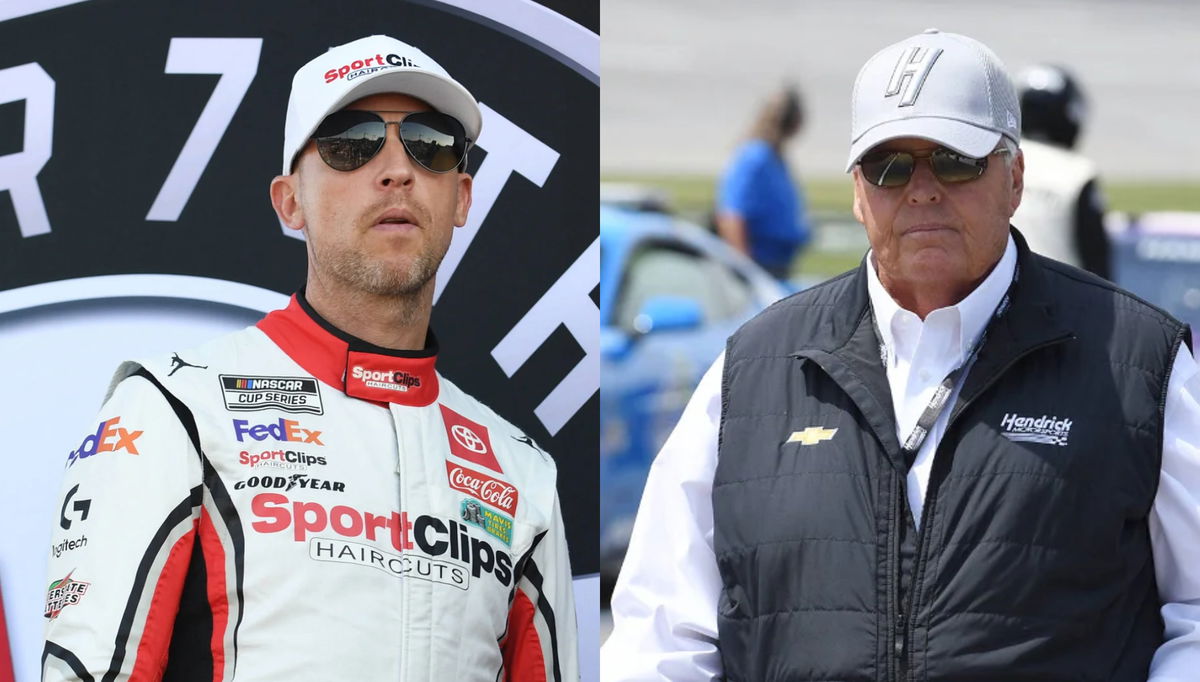
Imago
Image Credits – Imago

Imago
Image Credits – Imago
The ongoing legal clash between NASCAR and two prominent Cup Series teams has roots stretching back over two years of tense charter negotiations. In September 2024, NASCAR presented its final charter extension offer, which 13 of 15 teams accepted, but 23XI Racing, co-owned by Michael Jordan and Denny Hamlin, and Front Row Motorsports, owned by Bob Jenkins, refused to sign, citing unfair terms. This sparked an antitrust lawsuit filed in October 2024 in a Charlotte federal court, accusing NASCAR of monopolistic practices that stifle competition and harm teams, drivers, sponsors, and fans. But what began as a contract dispute has now spiraled into what many are calling a “financial civil war” inside the sport.
Watch What’s Trending Now!
Last year, Michael Jordan emphasized his commitment, stating, “I love the sport of racing and the passion of our fans, but the way NASCAR is run today is unfair to teams, drivers, sponsors, and fans.” NASCAR commissioner Steve Phelps acknowledged the strain, noting in a letter that “this litigation continues to be a cloud over the season, which is unfortunate.” As court rulings have flipped between granting and vacating injunctions, most recently with the Fourth Circuit’s reversal in July 2025, forcing the teams to race as open entries, the stakes keep rising, hinting at deeper divisions ahead. Yet amid these courtroom twists, a recent NASCAR move has sparked fresh debate about loyalty and finances in the garage.
NASCAR’s latest financial maneuver centers on a potential redistribution of funds tied to the charter system, where chartered teams enjoy guaranteed race entries and shares of media revenue. In a letter to the 13 teams that signed the 2025 agreement, commissioner Steve Phelps outlined that if 23XI Racing and Front Row Motorsports fail to secure their preliminary injunction and must repay earnings from the first 20 races as chartered teams, the remaining squads could each pocket an average additional $1.5 million per charter.
ADVERTISEMENT
This breaks down to about $838,210 from reallocating $25,146,300 in fixed and performance payments already disbursed, plus roughly $670,000 held in escrow for the season’s remainder if charter status isn’t restored. This payout has earned the label of a ‘financial civil war’ because it effectively incentivizes other teams to root against 23XI and Front Row, deepening rifts in a sport where collaboration once defined negotiations.
Jeffrey Kessler, attorney for the suing teams, called it “yet another tactic by NASCAR to divide the teams and distract from the facts of their monopolistic practices,” arguing it undermines collective efforts to reform the charter framework for broader benefits. With the charter system originating in 2016 to provide stability but now criticized for consolidating power with the France family, this strategy risks escalating tensions, as it could give signed teams a competitive edge in resources for 2026 while the lawsuit heads to trial in December 2025.
As this financial angle unfolds, a Reddit post makes it clear the fallout extends beyond the courtroom, stirring strong opinions among the NASCAR faithful who follow every development.
ADVERTISEMENT
Fan pulse: weighing in on the charter drama
One fan captured the magnitude of the shift, saying, “That’s a big shift-$1.5M per charter is no small bump. If 23XI and FRM lose their injunction, it’s not just them taking a hit, but every other team standing to gain in the redistribution. Curious to see how this plays out with long-term charter negotiations.” This reaction highlights how the potential windfall alters team dynamics, rooted in the charter system’s evolution since 2016, when it was meant to ensure financial predictability but has instead fueled disputes over revenue shares. With media rights deals increasing by 62% for 2025-2031, the extra funds could bolster R&D for signed teams, potentially widening competitive gaps.
ADVERTISEMENT
Shifting to the exhaustion many feel, another commenter quipped, “We should all be entitled to a settlement for having to read all this.” This sentiment echoes the drawn-out nature of the battle, which began with failed negotiations in 2023 and escalated to multiple injunction hearings, including the Fourth Circuit’s July 2025 reversal that stripped the teams of charter protections mid-season. Fans have endured layers of legal filings, from initial antitrust claims to countersuits alleging boycott threats, all while the sport competes for attention in a crowded landscape, as Phelps noted in his communications.
Building on that frustration, a third voice pointed out, “Trying to turn the herd against the two teams willing to take on the wolf is one strategy.” Here, the ‘wolf’ symbolizes NASCAR’s alleged monopoly, as detailed in the October 2024 complaint accusing it of controlling tracks, suppliers, and exclusivity rules that prevent alternative series. This tactic surfaces in evidence like executive texts leveraging charter losses, pitting the 13 signed teams benefiting from guaranteed purses against 23XI and Front Row, who argue their stand aims to grow the sport for everyone.
Delving into the math, someone questioned, “They’re spending more than $6M to save $3 million?” This probes the economics, where the $1.5M per charter equates to about $45M total across 30 charters, meaning 23XI and Front Row’s six charters would repay around $7.5M each from half-season earnings, figures tied to open teams receiving only 20-30% of typical purses.
ADVERTISEMENT
Finally, tying back to driver perspectives, a fan noted, “Dennis said the teams should get more money. Well, this is one way.” Referring to Denny Hamlin’s advocacy, rooted in his dual role as driver and owner, this underscores the irony in the redistribution, as Hamlin has criticized the France family’s control while pushing for equitable shares amid rising media revenues.
With the trial looming, such payouts could satisfy immediate demands but at the cost of unity, as teams like Spire Motorsports have called the offers fair, contrasting the plaintiffs’ view.
ADVERTISEMENT
ADVERTISEMENT
ADVERTISEMENT
